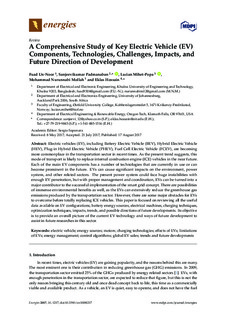| dc.contributor.author | Un-Noor, Fuad | |
| dc.contributor.author | Sanjeevikumar, Padmanaban | |
| dc.contributor.author | Mihet-Popa, Lucian | |
| dc.contributor.author | Nurunnabi Mollah, Mohammad | |
| dc.contributor.author | Hossain, Eklas | |
| dc.date.accessioned | 2018-06-12T09:34:09Z | |
| dc.date.available | 2018-06-12T09:34:09Z | |
| dc.date.created | 2017-10-30T16:03:26Z | |
| dc.date.issued | 2017 | |
| dc.identifier.citation | Energies. 2017, 10 (8), . | |
| dc.identifier.issn | 1996-1073 | |
| dc.identifier.uri | http://hdl.handle.net/11250/2501252 | |
| dc.description.abstract | Electric vehicles (EV), including Battery Electric Vehicle (BEV), Hybrid Electric Vehicle (HEV), Plug-in Hybrid Electric Vehicle (PHEV), Fuel Cell Electric Vehicle (FCEV), are becoming more commonplace in the transportation sector in recent times. As the present trend suggests, this mode of transport is likely to replace internal combustion engine (ICE) vehicles in the near future. Each of the main EV components has a number of technologies that are currently in use or can become prominent in the future. EVs can cause significant impacts on the environment, power system, and other related sectors. The present power system could face huge instabilities with enough EV penetration, but with proper management and coordination, EVs can be turned into a major contributor to the successful implementation of the smart grid concept. There are possibilities of immense environmental benefits as well, as the EVs can extensively reduce the greenhouse gas emissions produced by the transportation sector. However, there are some major obstacles for EVs to overcome before totally replacing ICE vehicles. This paper is focused on reviewing all the useful data available on EV configurations, battery energy sources, electrical machines, charging techniques, optimization techniques, impacts, trends, and possible directions of future developments. Its objective is to provide an overall picture of the current EV technology and ways of future development to assist in future researches in this sector. | |
| dc.description.abstract | A Comprehensive Study of Key Electric Vehicle (EV) Components, Technologies, Challenges, Impacts, and Future Direction of Development | |
| dc.language.iso | eng | |
| dc.title | A Comprehensive Study of Key Electric Vehicle (EV) Components, Technologies, Challenges, Impacts, and Future Direction of Development | |
| dc.title.alternative | A Comprehensive Study of Key Electric Vehicle (EV) Components, Technologies, Challenges, Impacts, and Future Direction of Development | |
| dc.type | Peer reviewed | |
| dc.type | Journal article | |
| dc.description.version | publishedVersion | |
| dc.source.pagenumber | 84 | |
| dc.source.volume | 10 | |
| dc.source.journal | Energies | |
| dc.source.issue | 8 | |
| dc.identifier.doi | 10.3390/en10081217 | |
| dc.identifier.cristin | 1509039 | |
| cristin.unitcode | 224,50,0,0 | |
| cristin.unitname | Avdeling for ingeniørfag | |
| cristin.ispublished | true | |
| cristin.fulltext | original | |
| cristin.qualitycode | 1 | |
